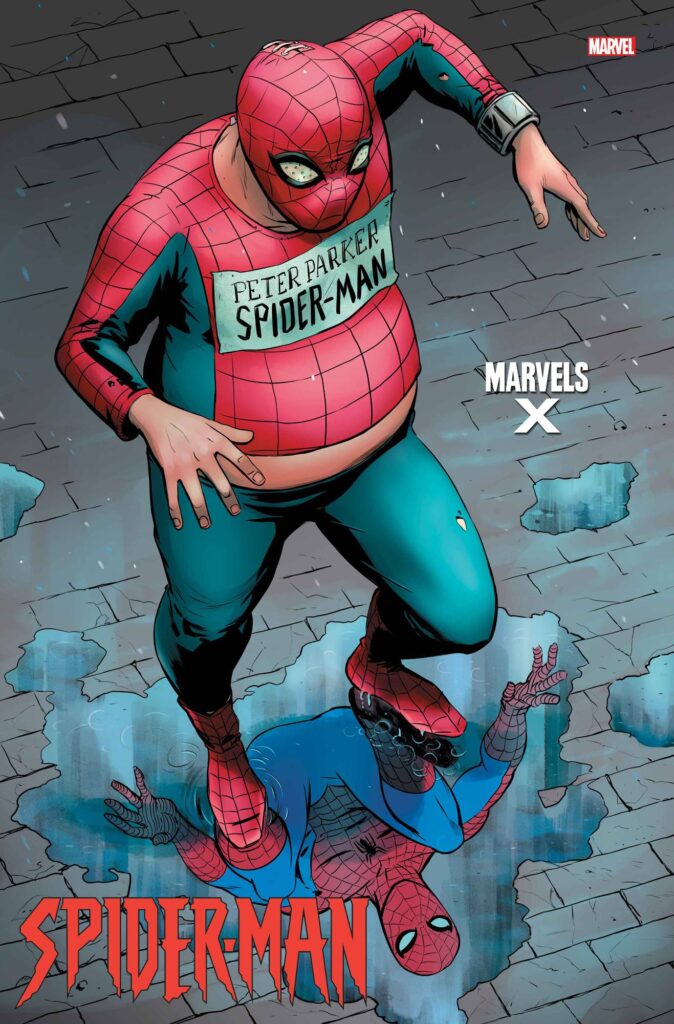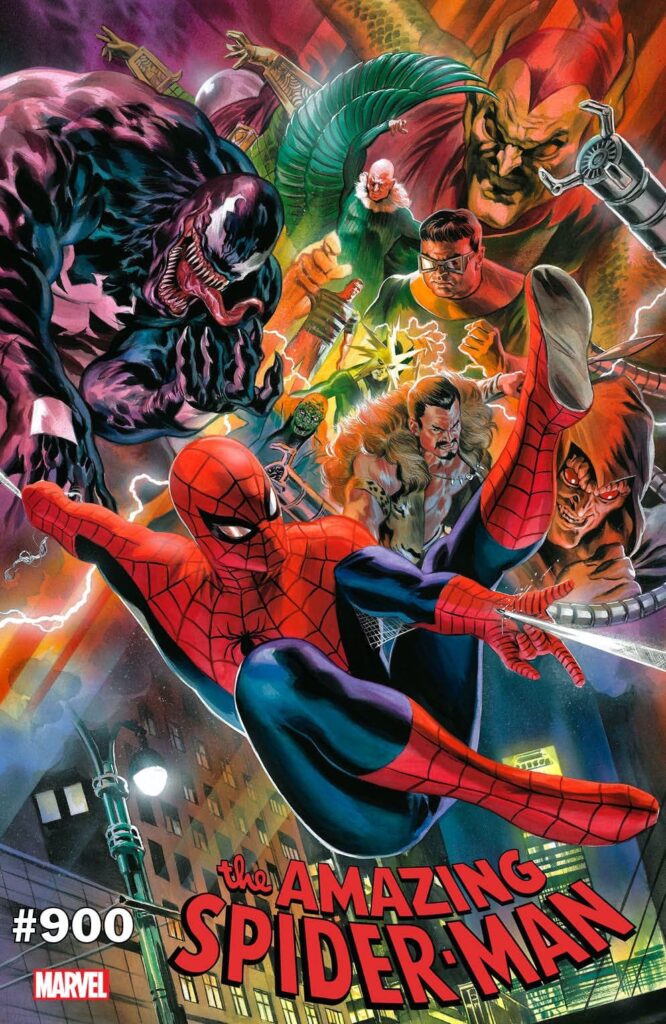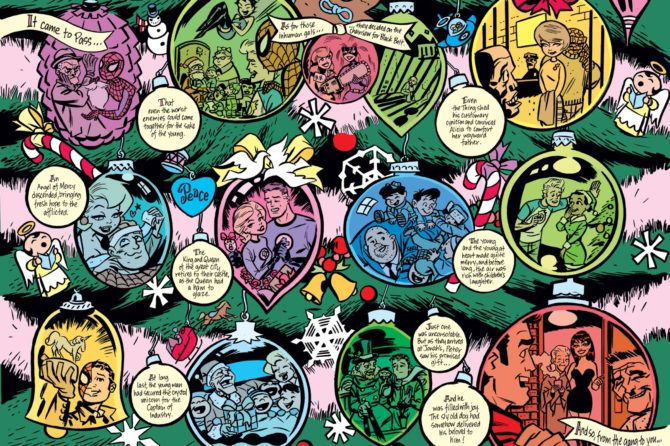This is a continuation of a sort of debate about the spider-marriage. In the first entry, André Santana and I discussed how we came to be Spider-Man fans, and to learn that there was any controversy about the spider-marriage. In the next entry, André will give his main argument for the marriage. For this entry, I’m going with the main argument for Spider-Man being single in the comics. I’ll try to be as precise as possible. My answer will be pragmatic rather than emotional about what I think is better for the comics, assuming that it continues to be an ongoing serial with no end in sight.
This may get to a conflict in how different fans primarily view the comics. Is it a platform for good stories? Or are these chapters in a grand tapestry where characters evolve until their story ends? My preference with Spider-Man is whatever leads to the greatest number of good comic books in the years to come, and I think that comes with an illusion of change approach.

The Illusion of Change is sometimes misunderstood. This isn’t like the old Archie comics (or golden age DC comics) where there’s pretty much no issue to issue continuity, and all the stories are entirely self-contained. This way there’s issue to issue continuity, and the status quo appears to advance. Stories still have consequences, but the creative teams prioritize not closing the door to future stories.
Peter Parker continuing from college to grad school, and still having similar complications is an example of an illusion of change development, as is Spider-Man joining the New Avengers, Peter getting a new job, or even breaking up with MJ. The marriage was different.
The marriage basically freezes an element of the status quo in a way that restricts the writers. The stories you get with the marriage are those that require Peter & MJ to be married. There aren’t that many of them, but there are stories that can’t be told with that status quo.
We’re eternally in Chapter 2 of the comics. Peter Parker shouldn’t have figured his life out yet. There’s a stage when most people have made 80% of major life decisions, and Peter Parker hasn’t gotten there yet. He doesn’t know what he’ll do for a living at fifty. He doesn’t know how long he’ll keep being Spider-Man. He doesn’t know whether he’ll have kids. I think this is key to the Spider-Man comics, both in terms of preserving an important part of the appeal of the character, as well as allowing for the most stories.

The writers want to shake up the status quo every few years. The spider-marriage means there’s one more thing that they can’t change. This leads to clumsy fixes like the clone saga, the 1998 relaunch and One More Day.
The marriage generally makes Peter’s life better. Any exception is temporary. That muddies the status quo- it’s not that things should always be bad, but this would be one element of the status quo where things are consistently great for Peter. He’s married to a beautiful and decent woman.
So, what do you think of the main arguments against the spider-marriage?
To this André replies (once again, his comments are in yellow to make it easier to distinguish us)…
With all of that being said (written, drawn) and done (published), should we all just… Forget all about it? Ignore it? Try to pretend that Peter Parker lives now in a New 52!-esque reality? That there are no stable facts or no-holds-barred ideas that cannot be undone or rewritten? That seventy years from now, when all the living-breathing Spider-Man fans are dead in gone, some new E-I-C in Marvel International Comics will introduce a new character in Peter ‘Chang’ Parker’s life called Gwen Li Stacy?

And while that hasn’t yet come to pass, do we need to deal again with another and ‘new’ version of a Peter Parker almost brought back to square one on his learning curve? Wasn’t that the whole point of Ultimate Spider-Man?
And adding insult to injury, by erasing the wedding, Peter became a worse younger version of himself – in a perpetual post-adolescence mentality acting like a reckless adult. Nothing like the Ditko and Lee’s version. Joe Quesada had the best of both worlds: The Ultimate young and single (already dating ultimate Mary Jane) Spider-Man hitting all the right cylinders, with the 616 Peter reattached to Mary Jane written by JMS also going strong. Wasn’t that enough?
So, when all of Marvel and DC’s heroes were rebooted over again, Superman, Batman, and Captain America were relaunched with the same experience and knowledge; Nightwing didn’t cease to exist and went back to being the first Robin, because Tim Drake and Damian Wayne (even freaking Jason Todd) were already there. When we analyze deeply what Superhero chronology has become, it’s a convoluted mess.

In order to keep our minds sane, all of us will finally give up everything and start reading Spawn – because (Todd) McFarlane vowed never, ever to reboot the character.
So finally answering one of Thomas’ questions: Is this still a good platform for reading good stories? If you’re referring to comics, absolutely. Superhero comics? With some caveats, yeah. Spider-Man comics? I think I’ll pass. Maybe they’re like The Beatles and Nirvana’s albums, time-wise. They had their hype in the beginning and in the end.
I like the Illusion of Change for the Spider-Man comics right now, and it seems that you favor more of a commitment to change.
I get the idea that it’s better if some things end. The Beatles are awesome, and I understand the whole argument that one thing that makes them special is that they didn’t get stale. They broke up before that was going to happen. Personally, I would have liked one more great album from them, although the counter-response is that this might have robbed us of their best solo work.
I’d rather Quentin Tarantino keep making movies even if his batting average declines. I’m glad Clint Eastwood didn’t retire at 75, because even if I haven’t been interested in everything he’s done in the last decade and a half, I enjoyed Letters From Iwo Jima, American Sniper, Gran Torino, Sully and Richard Jewell.

The Spider-Man story engine is great and flexible, and something that can work in multiple environments. But you get a different story engine if he changes and gets older. And it’s not going to be as successful a story engine.
Fundamentally, there seem to be two different views about what makes Spider-Man interesting. The first is that he’s the best of the young superheroes. He’s better than Tim Drake or Kamala Khan or Billy Batson. The second is that he is the hero who you have seen grow up.
There’s a false choice between having Peter Parker back to square one, and having a version who has been Spider-Man for more than half his life. He could be young without being a high school student who has only ever fought a handful of supervillains. There are some really good stories with a Peter Parker who has been Spider-Man for a few years, but hasn’t figured out his life yet (the Roger Stern Spider-Man.)

Last month, I did suggest a compromise of a line of Marvel comics that isn’t quite the Ultimate books (which were initially limited to year one stories), but would have recognizable versions of iconic characters which could complement a line of stories in the classic universe. So in that case you could have one title with a new version of Peter Parker balancing college, a part-time job and superhero duties, while there’s more flexibility to have another title with the 616 Spider-Man, where there no longer are the constraints about preserving the series for the next generation. And there can be other worlds with their own books.
I did only get one response to that (thanks, Aqu) which may suggest a lack of interest in any kind of compromise.
I do think it is important for writers to view themselves as borrowing the series from their successors, rather than inheriting it and making radical changes, which beget more radical changes, until the series is no longer recognizable.
Superhero continuity can be a convoluted mess, although the Spider-Man comics don’t have anything as obvious as the succession of Robins in the Batman comics (admittedly, Normie Osborn is getting close.) With a commitment to change approach, Marvel may end up having something like that, because they’re going to want a recognizable version of Spider-Man, which would be balanced with new developments (whatever job he gets, however many kids he has, etc.)

I don’t think having a Peter ‘Chang’ Parker is an argument against the illusion of change. That’s something that would have to be in some alternate universe, which may work better for people who want the 616 Spider-Man to grow in new and permanent ways.
The next entry is the argument for why the marriage was a good idea, and why bringing it back would work for the series. I asked André if he has any further thoughts on sticking with an illusion of change approach? But he wants to get to his part.










@Patrick Stack – I’ve heard the whole “getting married is the end of Peter Parker’s story” so many times, and I wonder if those people have ever been married or known anyone that was married. Since when does getting married mean all potential conflicts are over and you will live “happily ever after”?
Wow. If you think that on your wedding day (and I say this as someone who has been married for 39 years) that you’ve made 80% of your life decisions – boy, are you in for a rude awakening!
But, I’ve heard this general argument from others, including Marvel and everytime I wonder: since when is marriage the end? From my experience and to paraphrase Winston Churchill: Marriage isn’t the end, it’s not even the beginning of the end, but it may perhaps be the end of the beginning.
Very interesting read.
I think you can have both progression and illusion of change thanks to legacy characters.
You want a married, older, wiser Spider-Man? You got Peter.
You want a younger, learning-the-rope, wide-eyed character? You got Miles.
Marvel is in the perfect position to get their cake and eat it too.
The problem with a single spider man is, i believe, the lack of good stories built upon it since omd. I can’t remember a single story that couldn’t have been written with MJ in the picture. It’s mostly a gimmick at this point.